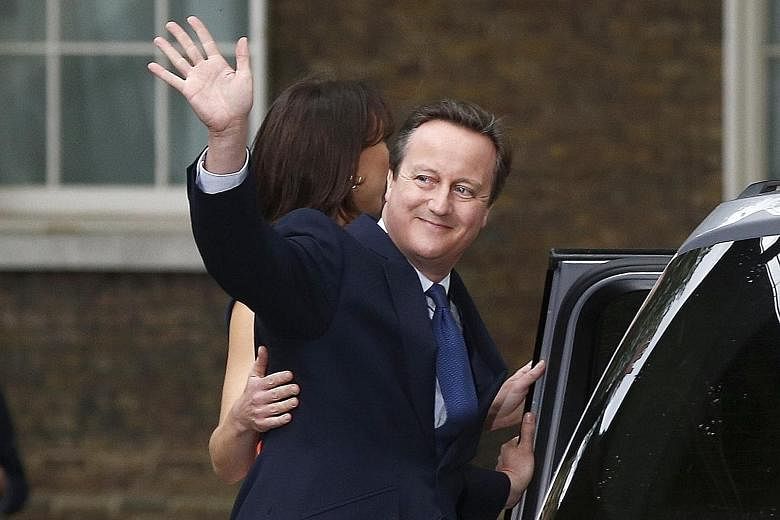In a rare show of unanimity, Britain's politicians have paid tribute to former prime minister David Cameron after he announced his resignation from Parliament and his immediate retirement from politics at the tender age of 49.
Prime Minister Theresa May, his immediate successor, praised Mr Cameron's "great strides on social reform" during his tenure in office, which started in May 2010 and ended with his government's resignation in early July this year.
And even Mr Jeremy Corbyn, the far-left leader of the Labour opposition party, spoke graciously about the former premier, urging voters "to respect people when they move on to do something else in their lives".
 Mr David Cameron and his wife Samantha in front of No. 10 Downing Street on July 13, his last day in office as prime minister. He resigned as PM shortly after his defeat in the June 23 referendum in which Britain voted to leave the European Union. PHOTO: REUTERS
Mr David Cameron and his wife Samantha in front of No. 10 Downing Street on July 13, his last day in office as prime minister. He resigned as PM shortly after his defeat in the June 23 referendum in which Britain voted to leave the European Union. PHOTO: REUTERS Yet no measure of civility can hide the fact that Mr Cameron's career ended in abject failure, culminating in Britain's departure from the European Union.
His decision to resign his parliamentary seat is unusual, but not unprecedented: While former prime minister Gordon Brown continued to serve in Parliament for five more years after his general election defeat in 2010, Mr Tony Blair, who ruled Britain during the 1990s and in the first decade of this century, stood down as MP and as prime minister at the same time.
Mr Cameron's resignation makes political sense. As he admitted, there was a "very real danger" that anything he said in Parliament would be interpreted as "driving a real wedge" between him and the government, making life harder for Mrs May's administration.
The by-election which now has to take place in his constituency is also unlikely to present the government with much difficulty. For the parliamentary seat of Witney in rural Oxfordshire - just outside the famed university which is his alma mater - has been controlled by the ruling Conservatives since the 1970s with huge majorities, and is guaranteed to remain in government hands.
Still, Mr Cameron's hasty departure draws unwelcome attention to a record of a leader who tried to adapt politics to an era when ideology and old party loyalties no longer mattered, but ended up confusing showmanship with substance.
He took over as leader of the Conservatives in 2005, after the party suffered three general elections defeats in a row. He understood that the Conservatives required a complete overhaul, but given his career in the public relations industry, he saw this as just a PR makeover exercise.
He frequently allowed himself to be photographed biking to work, and undertook a high-profile visit to the Arctic in an effort to persuade the electorate that a party which used to be the preserve of the old and rich finally embraced vitality and modernity. It worked, but only just: his electoral victories in both 2010 and 2015 were by some of the lowest margins in recent memory.
Mr Cameron's commitment to social justice was genuine. But his promise to "always look after the elderly, the frail and the poorest" was never fulfilled.
And notwithstanding his frequent talk of social inclusion, he led one of the most cliquish British governments in recent memory: He and finance minister George Osborne, his university friend, ran Britain almost single-handedly.
Mr Cameron's fatal failure was his decision to hold a referendum on Britain's membership of the EU. No such ballot was required and there was little clamour for it; he pushed it through in June this year partly because he believed that the referendum would silence his critics inside the ruling party, and partly because he had unlimited faith in his ability to persuade the electorate to vote to remain in Europe.
The electorate did not oblige, and he now goes down in history as the man who put the interests of his party ahead of those of his country, and ended up jeopardising both.
Mr Cameron's legacy has already been repudiated by the current Prime Minister. His closest ministerial allies - most notably Mr Osborne - were unceremoniously sacked. And Mrs May used her first address on the steps of her Downing Street prime ministerial residence to vow that her she would not govern "just for the privileged few", a thinly veiled attack on her predecessor.
Mrs May is everything Mr Cameron is not: methodical, calm and disdainful of showmanship.
His retirement will help her efforts to implement measures such as the reintroduction of state secondary schools that select their pupils by means of an examination - a policy Mr Cameron opposes despite the fact that he attended one of Britain's most exclusive private schools.
But above all, his departure from parliament gives Mrs May the opportunity to portray herself as heading an entirely fresh administration, unencumbered by previous mistakes.


